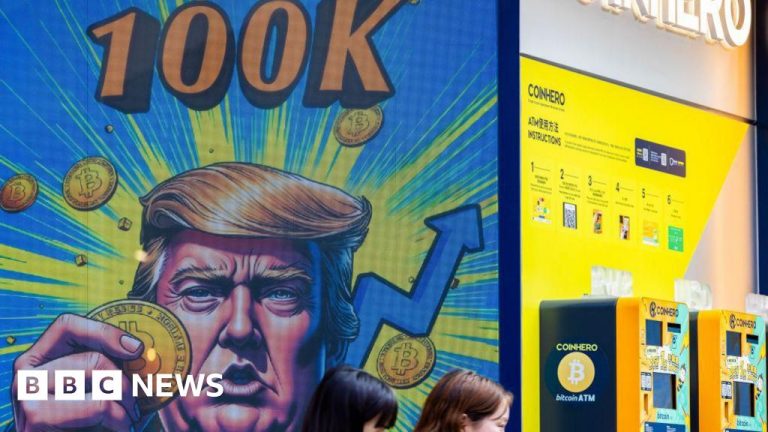Bitcoin's price has crossed the long-awaited $100,000 threshold, raising questions about how high it could go – and whether it can shake off its notorious volatility.
The world's largest cryptocurrency hit around $103,400 shortly after 0400 GMT on Thursday, before falling slightly.
Dan Coatsworth, investment analyst at AJ Bell, described it as a “magical moment” for cryptocurrency and said there was a “clear link” to Donald Trump’s election victory.
Trump took to social media to celebrate the milestone, posting “congratulations Bitcoiners” and “you're welcome!”
The president-elect previously pledged to make the United States the “crypto capital of the world” and the “Bitcoin superpower,” helping to drive the price of Bitcoin higher once he was elected president.
It crossed the $100,000 mark after Trump announced he would nominate former Securities and Exchange Commission (SEC) Commissioner Paul Atkins to lead the Wall Street regulator.
Mr. Atkins is considered much more pro-cryptocurrency than the current leader, Gary Gensler.
“There is a clear expectation that the new administration will be a little more crypto-friendly than the old administration was,” said Andrew O'Neill, a digital assets expert at S&P Global.
“So for the price of Bitcoin, I think that's what's driven the trend so far (and it will continue) probably into the new year,” he added.
However, Bitcoin has a history of sharp declines as well as rapid rises – and some analysts have warned that this is unlikely to change.
“Many people have gotten rich from the skyrocketing value of cryptocurrency this year, but this high-risk asset is not for everyone,” Mr Coatsworth said.
“It’s volatile, unpredictable and driven by speculation, none of which constitutes an overnight investment.”
During the US presidential election campaign, Trump sought to attract cryptocurrency investors by promising to fire Gary Gensler, chairman of the US financial regulator, the Securities and Exchange Commission (SEC), on “day one” of his presidency.
Mr. Gensler's approach to the cryptocurrency sector has been significantly less friendly than Trump's.
He told the BBC in September that it was an industry “riddled with fraud, hucksters and scammers”.
Under his leadership, the SEC has initiated a record 46 crypto-related enforcement actions against companies in 2023.
Mr. Gensler said in November that he would resign on January 20, the day of Trump's inauguration.
The choice of Paul Atkins to replace him as head of the SEC was welcomed by crypto advocates.
Mike Novogratz, founder and chief executive of US crypto firm Galaxy Digital, said he hoped the “clearer regulatory path” would now accelerate the digital currency ecosystem's entry into “the financial mainstream” .
Bitcoin has seen fewer drastic drops in value in 2024 than in previous years.
In 2022, its price fell significantly below $16,000 after the bankruptcy of crypto exchange FTX.
A number of key events, in addition to Trump's election victory, have helped to bolster investor confidence that the stock's value will continue to rise.
The SEC has approved several spot Bitcoin exchange-traded funds (ETFs) allowing giant investment firms like Blackrock, Fidelity and Grayscale to sell products based on the price of Bitcoin.
Some of these products have generated cash inflows worth billions of dollars.
But its potential for a sudden drop in value is a reminder that it is not like orthodox currencies – and that investors have no protection or recourse if they lose money on Bitcoin investments.
Carol Alexander, professor of finance at the University of Sussex, told BBC News that fear of missing out (FOMO) among young people will see the price of Bitcoin continue to rise.
But she added that while it could spark a rise in other cryptocurrencies, many young investors investing in meme coins are losing money.
Kathleen Breitman, co-founder of another cryptocurrency – Tezos – also warned those who would be tempted to invest in Bitcoin.
“These are markets that tend to move on momentum, so you have to be extremely careful,” she told the BBC.

